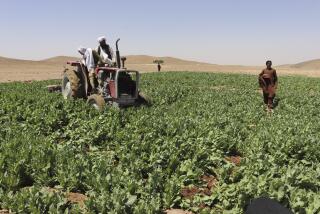British to Bolster Afghan Border
- Share via
BAGRAM AIR BASE, Afghanistan — Seeking to prevent Al Qaeda or Taliban fighters from returning to Afghanistan or disrupting the country’s efforts to choose new leaders, hundreds of British troops Wednesday began a new operation near the border with Pakistan, military officials said.
British officials described the mission near the eastern city of Khowst as a stabilization effort, and said Royal Marines would be conducting patrols through villages as well as launching covert operations into nearby mountains lined with trails into Pakistan.
The operation comes at a time when U.S. military officials say few Al Qaeda and Taliban fighters are left in Afghanistan. U.S. Army Maj. Bryan Hilferty, spokesman for coalition forces, on Wednesday likened the country to a house that has been rid of pests by an exterminator.
Operations continue, he said, because “you need the exterminator to keep coming back to make sure the cockroaches don’t return.”
Hilferty said U.S. officials believe that between 100 and 1,000 Al Qaeda operatives are hiding in Pakistan, which might be shifting its resources toward the disputed Kashmir region in the nation’s conflict with India. He declined to say whether the United States had added patrols or adjusted plans to compensate for any troop shift by Pakistan away from the Afghan border.
The British operation appears to mark a change in tactics from recent--largely uneventful--missions in which troops have typically been deployed by helicopter to comb remote, unpopulated regions for Al Qaeda and Taliban holdouts.
In Operation Buzzard, as it is being called, about 200 soldiers traveled to the Khowst area in a highly visible, 32-vehicle convoy. They are to spend much of their time patrolling large swaths of territory, trying to gather information from villagers on the militants’ hide-outs and weapons caches.
“We’re making a big effort to engage with village elders in the community,” said a British military leader who discussed the operation on condition of anonymity. The operation is expected to last longer than previous missions--spanning a month or more--with the number of troops deployed ranging from 350 to 700.
The mission is timed in part to discourage interference by Al Qaeda and Taliban loyalists with the planned June 10-16 meeting of the loya jirga, or grand council, to select a new transitional Afghan government.
“That’s what terrorists do, they try to disrupt the process,” Hilferty said, adding that they might try “typical terrorist attacks” such as suicide or car bombings.
The British officer said Al Qaeda fighters “need some kind of symbolic victory” after being driven from Afghanistan. Regional warlords and Islamists opposed to Western intervention also might seek to disrupt the election, he said.
The operation is something of a public relations campaign in a territory where many remain uncomfortable with the foreign military presence. Much of the population is illiterate, the British official said, and unaware of the Sept. 11 terrorist attacks.
British Brig. Roger Lane explained the mission on Afghan radio Wednesday. “We have no strategic self-interest in staying here in Afghanistan,” he said in a broadcast that was translated into the Pashto and Dari languages. “We are here because Al Qaeda harbored terrorists who killed 3,000 people in New York on Sept. 11.”
A small American civil affairs military unit accompanied the British troops to arrange for delivery of drinking water and other humanitarian aid.
More to Read
Sign up for Essential California
The most important California stories and recommendations in your inbox every morning.
You may occasionally receive promotional content from the Los Angeles Times.












